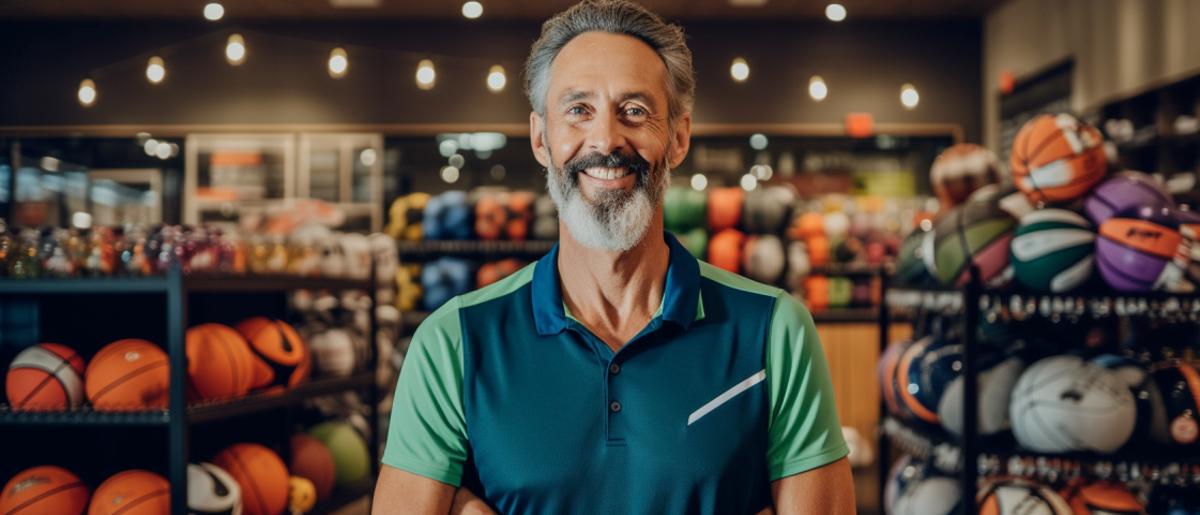

In the highly competitive world of sports retail, trying to stay ahead of the game is crucial. With the vast expanses of Australia's coasts, mountains and cities alike being a playground for an array of sports activities, the need for high-quality sports equipment continues to rise. Resolute sports equipment retailers know that having the right stock at the right time can make all the difference. However, maintaining inventory levels, upgrading to meet emerging trends, or simply keeping afloat during lean seasons, often requires significant funds. This is where business loans come in. Being strategically equipped with a business loan, retailers can strengthen their financial position, enabling the much-needed flexibility and dexterity. This could mean the difference between missing a shot and scoring a goal in the vast field of sports equipment retailing in Australia. Business loans are not just a lifeline during turbulent times; they're an essential tool for growth and sustainability.
Compare over 40+ lenders with one application.
In Australia, the role of sports equipment retailers carries notable importance. Australians love their sport; it’s enmeshed into the national fabric. It's this passion that underscores the need for quality and diverse sporting equipment provided by these retailers. For every cricket enthusiast needs a bat, every rugby player a ball and boots, and every swimmer a quality pair of goggles. These fundamental equipment requirements for participation highlight just how vital sports equipment retailers are in facilitating Australia's love of sport. Their role stretches beyond the supply of equipment; they act as the key distribution network which enables individuals to participate and compete in the sports that they love. Sports equipment retailers contribute significantly to the Australian economy. With a thriving sports culture, the demand for sports equipment is high. This translates into a healthy industry that generates employment opportunities and economic growth. In addition, they play a pivotal role in enhancing performance and ensuring safety. By offering high-end equipment fitted with the latest technology, retailers help athletes and recreational players alike to perform at their best with minimal risk of injury. Lastly, sports equipment retailers boost community sports initiatives. They often form local partnerships with clubs, offering equipment sponsorships and grants, helping to nurture grass-root level sports. This symbiotic relationship ensures the ongoing sustainability of community sports initiatives whilst building customer loyalty for the retailer. In summation, sports equipment retailers in Australia serve as a crucial bridge connecting the sporting community, the economy, and the sports industry at large. Their importance cannot be understated.
Learn about eligibility and how to apply.
The retail landscape can be a challenging one, especially for stores like Sports Equipment Retailers. In Australia, sports equipment businesses not only have to tackle the ever-increasing competition, both in the brick-and-mortar and online sphere, but also deal with a range of other obstacles. The fluctuating consumer demand is a key struggle. Australia's love for sports is well-documented, but the popularity of sports goods can often vary greatly. With each season, there's a shift in sports preferences leading to unpredictable inventory management issues. Overstocking or understocking can lead to an inefficient usage of cash flow, a precious resource for any retail business. Another challenge is staying current with technology and digital transformation. To compete effectively, businesses need to have an online presence, offer seamless digital services and use data analytics for inventory management, marketing and sales. Building and maintaining these digital competencies requires a significant investment. Lastly, let's not forget about the regulatory landscape. Australian sports equipment retailers must adhere to various regulations and safety standards, making compliance another area that necessitates financial outlay. Overhead costs, including lease, maintenance, and staffing, are consistent challenges as well. All these financial challenges collectively highlight the potential need for flexible financing options like business loans to fuel growth and operations. With suitable financial backing, sports equipment retailers can much better navigate these obstacles, ensuring a healthy and robust business able to serve Australia's sports lovers.
Calculate your repayment estimates and more.
Exploring the avenues of business loans can be a transformative game-changer for Sports Equipment Retailers. Spanning beyond the obvious assistance in maintaining cash flow, these loans can directly serve to surmount the challenges we previously delineated. They provide the requisite capital for essential investment in advanced sports gear and specialised equipment, ensuring a competitive edge in the marketplace. Furthermore, they can facilitate the launch of new marketing initiatives designed specifically to augment visibility and brand reach. A significant advantage of business loans is the opportunity to maximise on expansion possibilities. Whether it's opening another outlet in a high-demand locality or streamlining online trading capabilities, a well-structured loan can pave the way for growth without straining operational resources. The intricacies of expanding a business mustn't be taken lightly, and through sensible loan assistance, retailers can meet their ambitious targets while minimising risk. Lastly, another overlooked yet essential benefit of these loans is their ability to cushion against unexpected expenditures or seasonal fluctuations. The sports retail industry is not exempt from facing thin sales periods, and a robust financial backup in the form of a business loan can ensure operations continue without a hitch during these times. In essence, business loans provide the resilience, adaptability and leverage that Sports Equipment Retailers require to thrive in today's competitive landscape.
Sports Equipment Retailers in Australia have access to several types of business loans. They can opt for unsecured or secured loans, allowing flexibility depending on business needs. Lines of credit provide cash-on-demand for unexpected expenses, while equipment finance loans directly facilitate purchasing essential sports gear.
There are several types of business loans in Australia that can benefit Sports Equipment Retailers. Each of these loan types has its unique features, advantages, and potential disadvantages. Here are some of the most common types of business loans for Sports Equipment Retailers:
Line of Credit
A line of credit provides sports equipment retailers the flexibility to draw funds up to a certain limit as the need arises. This can be particularly useful during peak sporting seasons, for bulk purchases, or to handle unexpected expenses.
Term Loans
Term loans are a lump sum that sports retailers repay over a set time span, often used for significant investments like upgrading an entyre line of equipment or expanding store locations.
Equipment Finance
A fitting option for sports equipment retailers, equipment finance allows businesses to borrow funds specifically to purchase new equipment. Payments are typically made over the lifetime of the equipment.
Merchant Cash Advances
This financing option involves a lender providing a lump sum payment in exchange for a portion of future sales. It can provide quick access to capital when needed.
Invoice Financing
Sports retailers supplying to schools or professional teams can leverage their unpaid invoices to gain immediate access to funds, aiding cash flow during payment waiting periods.
Commercial Property Loans
For retailers looking to own their own shop front, a commercial property loan can provide the necessary capital for such a substantial investment.
Inventory Loans
Inventory loans can help sports retailers manage their stock levels, by providing the necessary funds to purchase inventory in advance of high demand periods.
Unsecured Loans
Unsecured loans do not require collateral, making them suitable for retailers that do not have assets but need quick access to funds.
Trade Finance
For retailers importing vast amounts of sports equipment, trade finance can provide support to smooth out the supply chain process.
Overdraft Services
Overdrafts can provide retailers with short-term cash flow support to cover daily operational expenses, such as staff wages or utility bills.
Sports equipment retailers in Australia could utilise business loans to expand inventory, refurbish stores, or launch marketing campaigns. These targeted expenditures can augment brand reputation, customer engagement and ultimately profit margins. Decisive investment via business loans can lead such businesses towards growth and sustenance in the competitive market.
Here are some common reasons Sports Equipment Retailers use business loans:
Inventory Expansion
Business loans allow sports equipment retailers to expand their inventory, offering a wider range of products to customers. This can support more sports disciplines, catering to a broader customer base.
Renovating Stores
Many retailers use business loans to renovate their physical stores, enhancing the customer shopping experience with modern, appealing, and accessible facilities.
Advanced Technology
Business loans can fund investment in advanced technology, improving in-store and online shopping experiences through features like robotics, AR/VR, and AI.
Marketing Campaigns
Business loans can fuel effective marketing campaigns aimed at reaching a larger audience. These can involve digital marketing, sponsorships, and strategic collaborations.
E-commerce Development
As the online market grows, sports equipment retailers can use business loans to build or expand their e-commerce platforms, allowing them to reach customers beyond their local areas.
Cash Flow Management
Business loans provide sports equipment retailers with the necessary funds to manage their cash flow, ensuring business continuity during off-peak seasons and stabilising operations.
Staff Training
With the aid of business loans, retailers can invest in their staff, providing professional training in sales strategies, customer service and product knowledge.
New Store Launches
Business loans can provide the initial investment needed to launch new stores, aiding businesses in their expansion efforts.
Supply Chain Management
Loans can help retailers optimise their supply chains, getting the right equipment to the right place at the right time, ensuring customer satisfaction and loyalty.
Debt Consolidation
Retailers often use business loans to consolidate their debts, lowering their monthly overheads by combining various obligations into one manageable payment.
To estimate your monthly repayments and the total cost of the loan, input the loan amount, loan term and interest rate into the calculator below. This helps you plan your budget and choose the most suitable loan terms.
These helpful FAQs will help you find the answers you need. If you can't find what you're looking for, you can request a callback below.